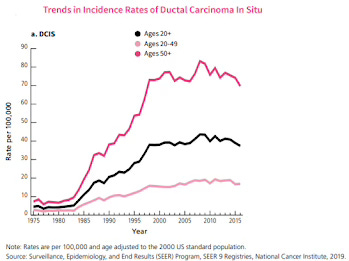Using AI to fight breast cancer
AI will be useful. Much more useful than being employed to cheat in college
Ductal carcinoma in situ (DCIS), is a type of cancer that arises when abnormal cells replace the normal lining of the breast’s milk ducts, potentially leading to duct and lobule expansion. DCIS is a challenge for our modern society, it is prevalent and it’s hard to detect correctly.
How bad? Well, consider that DCIS:
Constitutes about 83% of all in situ cases
Roughly 20-25% of all breast cancer diagnoses
Noninvasive, BUT it's considered a precursor to invasive breast cancer, with women diagnosed with DCIS being ten times more likely to develop this more aggressive form of the disease.
Approximately 40% of DCIS cases will progress to invasive cancer.
Thankfully, a breakthrough in artificial intelligence (AI) research may be poised to change that.
An interdisciplinary team of scientists from MIT and ETH Zurich has developed an AI model capable of identifying the different stages of DCIS from simple, inexpensive breast tissue images. It does this by examining how cells within breast tissue are arranged, an indicator towards the tumor’s potential to become invasive.
“This is a significant step forward in our understanding of DCIS, by leveraging AI, we can potentially streamline the diagnostic process, allowing clinicians to focus on more complex cases and reducing unnecessary treatments.” said Caroline Uhler, a professor at MIT and co-author of the study.
This particular AI model was trained on a vast dataset of tissue images, setting the stage for determining and recognizing common patterns associated with different stages of DCIS. When compared to the assessments of human pathologists, the model demonstrated remarkable accuracy in many instances.
The potential implications of this research are profound, in the best ways. Predicting the likelihood of DCIS progression, will enable doctors to more informed treatment decisions. This should reduce the risk of needless over-treatment while ensuring that high-risk patients receive appropriate care.
Additionally, the AI model could be adapted to analyze other types of cancer, offering hope for improved diagnosis and treatment across multiple diseases.
This is still early. A key next step will be clinical trials to validate the model’s effectiveness in real-world settings.
Nevertheless, the findings offer a glimmer of hope for countless women facing the uncertainty of a DCIS diagnosis.
Saving lives and improving the quality of life for countless patients.
AI may have some good upside.






This is good news indeed! And you are to be commended for sharing the good news, part of which your family helped make true! A great legacy!